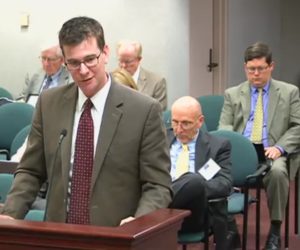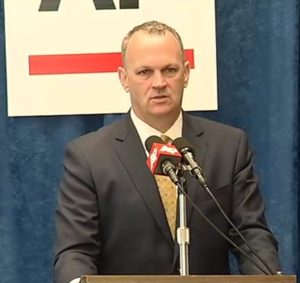Representatives of four high-profile charter school networks told a Florida House committee they are eyeing the state for future expansions. They also discussed the barriers that might keep them away.
When it comes to attracting top charter school operators, the Sunshine State has a lot going for it.
It's the third-largest state. Its population is growing — so much so that some districts are rolling out the welcome mat to charters that might help exert growth. Its 20-year-old charter school law is ninth-best in the nation, according to the National Alliance for Public Charter Schools. It has more than 650 charter schools and thriving school choice culture. But since charters enroll one in ten of its 2.8 million public school students, it isn't totally saturated.

Peter Bezanson, of BASIS charter schools, testifies before the Florida House Choice and Innovation Subcommittee.
And yet, the state has struggled to attract the kind operators that appeared before the House Choice and Innovation Subcommittee this week — organizations that draw national headlines for targeting the most disadvantaged students and pushing them toward college.
Each of the charter groups cited potential obstacles that, in one form or another, are on lawmakers' radar during the upcoming legislative session: Teacher certification rules, school facilities, equitable funding.
BASIS runs academically "hyper-accelerated" charter schools in Arizona, Texas and Washington. Its schools push ninth-graders to take precalculus and require their students to take at least six Advanced Placement exams. It's created elementary schools and extended school days to make its demanding academics accessible to low-income students.
CEO Peter Bezanson said Florida is one of the top four states where BASIS eyeing future growth.
"We wanted to be a great choice, a high-quality choice for every kid who is willing to work hard," he said.
BASIS schools like to hire "subject-expert teachers," Bezanson said. If teachers are well-trained in a subject like physics and have an ability to connect with students, he said, certification exams and other regulations become needlessly onerous. (more…)

Florida House Speaker Richard Corcoran addresses reporters during a media briefing ahead of the Spring legislative session.
Florida's High-poverty urban areas shouldn't have to rely on wealthy backers to attract top charter schools, the state's House speaker told reporters this morning.
If the state wants more charters with national reputations for serving low-income students, he said, policies will need to change.
Speaking at an annual media briefing hosted by the Associated Press, Rep. Richard Corcoran, R-Land O' Lakes, lamented the fact that Florida has a lone collection of KIPP schools in Jacksonville and a single public charter boarding school — SEED Miami.
Both institutions receive annual line-item appropriations from the Legislature. The funding is intended to cover the cost of the extra instructional time needed to help low-income students catch up academically. But that funding doesn't cover all of their costs. (more…)

The scene that greets students arriving at SEED Miami's campus, housed at Florida Memorial University.
Florida's first-of-its kind public boarding school has had to slow its growth plans for this school year after state funding didn't keep up.
The state Board of Education is expected to meet Monday at the SEED School of Miami, housed on the campus of Florida Memorial University. The agenda includes a change to the school's growth plans, which are part of state contract created under a 2011 pilot program.
During the 2014-15 school year, SEED Miami's first in operation, the state gave the school $1.4 million, allowing it to serve 60 students. Plans initially called for hiking the funding to about $3 million, allowing the school to double its enrollment this year as it added a class of seventh-graders. The school received $2 million in the current state budget — enough to serve about 78 students. (more…)
An expansion of Florida's Personal Learning Scholarship Accounts wasn't the only school choice-related issue that found new life in a state budget deal reached this week.
The new $78 billion spending plan, set to come up for a final vote Friday, would increase funding for public schools and address a handful of the issues we followed during the regular legislative session.
Digital classrooms. The classroom technology push would get a $20 million boost, or a 50 percent increase. Charter schools were less likely to take advantage of the program last year. Legislation tied to the budget would require the state Department of Education to create a "streamlined" process for charters to submit their digital classroom plans, which might make it easier for them to participate. The extra money might help make it worth their while.
Charter schools. Charter schools would take a haircut in their funding for buildings. Capital funding would decline by a third, to $50 million. School districts would also get $50 million for repair and maintenance, and a larger chunk of money would be divided among school construction projects in rural districts. (more…)
Antanarie Edge almost missed the chance she was hoping for. There were 60 slots for the first sixth-grade class at Florida's first and only public boarding school, The SEED School of Miami, but 104 students had applied. When the school held a lottery to see who would get in, Antanarie was not among the lucky ones.
Then, about week into the school year, her phone rang. It was her mom. A spot had opened.
"I started jumping up and down," she said.
Now a few months into her first year at SEED Miami, Antanarie says the reasons for her excitement have become more clear. During the week, the school is a home away from home for its students, half of them boys and half of them girls. They spend five full days eating, sleeping and attending classes in an academic oasis, a re-purposed dormitory at Florida Memorial University.
When the Miami charter school opened this fall, it became the third in a network of college-preparatory boarding schools whose model has been featured on 60 Minutes and in films like Waiting for Superman. Like existing SEED schools in Washington and Maryland, it targets some of the most disadvantaged students, for whom a seven-hour school day may not provide enough support to reach their ultimate goal: college.
Separated from the stigmas that often dog teenagers in school, students like Antanarie are free to try new things. She's enjoyed signing up for CrossFit sessions. But above all, she’s been able to focus like never before on the goal that drove her to the school in the first place: Making it to college.
When students arrive on Sunday afternoons, they're greeted by a row of pennants from universities, one of the many cues intended to reinforce the college-going culture that is common among no-excuses charter schools.
Jerico Evans, one of SEED Miami's student life counselors, said the school wants students to believe, even in middle school, that college is a basic expectation — even if it might not be for other kids in their neighborhood.
Evans previously taught in Miami-Dade public schools and now is working toward a master's degree in educational leadership at Johns Hopkins University. He said he's seen this emphasis on college rub off. Before he took a job at SEED, he said, "I never met a sixth-grader who wanted to go to MIT."
As a student life counselor, Evans works with students after the school day ends, from about 4 p.m. to midnight. He helps students with homework and leads character-education lessons. He's also charged with making sure students read – not only during required reading time, but for class, for pleasure, to fill idle moments.
Antanarie said she's seen a shift in her own attitude about reading.
 The newest addition to Florida’s portfolio of learning options is part of a public boarding school network that 60 Minutes called "one of the most successful and innovative public schools in the country."
The newest addition to Florida’s portfolio of learning options is part of a public boarding school network that 60 Minutes called "one of the most successful and innovative public schools in the country."
The SEED Foundation school in Miami, set to open this fall, is modeled after the college-prep SEED schools in Washington D.C. and Baltimore. According to the foundation, 90 percent of its graduates have enrolled in college and 60 percent have graduated or soon will graduate from college.
“We offer the gift of time, education and support, 24 hours a day, five days a week,” Kara Locke, who will become head of school in Miami, said in a phone interview with redefinED.
Business consultants Eric Adler and Rajiv Vinnakota established The SEED Foundation in 1997 after spotting an opportunity to provide better education options for at-risk students. "There's boarding schools for rich kids; why aren't there boarding schools for poor kids?" Vinnakota told 60 Minutes in 2010. "The intense academic environment, the 24-hour aspect and constant access to role models. Why wouldn't all of those things be just as important for poor kids as it would be for rich kids?"
SEED schools emphasize traditional academics, college preparation, self-confidence, discipline, responsibility, athletics and performing arts. Along with a safe place to live, play and study, students receive three meals a day and the opportunity to develop relationships with strong mentors and role models.
Tuition is free. The school receives public support for operating costs but raises private funds to support capital and start-up costs. Students live in a dormitory during the week. “It is a home” and “a nurturing place,” said Locke, who served as principal of the SEED school in D.C. from 2007 to 2013 and lived in the school’s dormitories for the last five years.